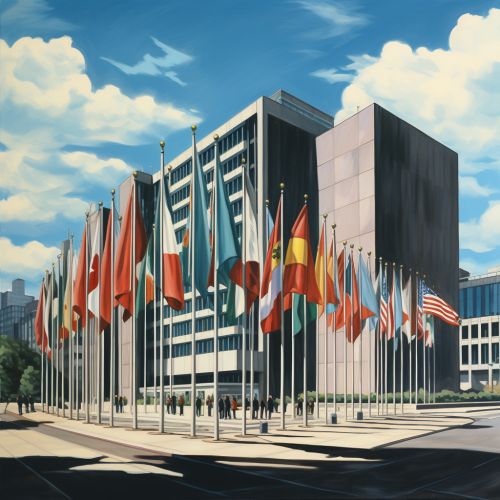United Nations
Overview
The United Nations (UN) is an international organization founded in 1945. It is composed of 193 member states and two observer states, and its headquarters are located in New York City, United States. The UN was established after World War II with the aim of preventing future wars, promoting peace and security, fostering social and economic development, protecting human rights, and coordinating international cooperation in solving international problems.
History
The idea of the United Nations was conceived during World War II. On January 1, 1942, representatives of 26 Allied nations fighting against the Axis Powers met in Washington, D.C. to pledge their support for the Atlantic Charter by signing the "Declaration by United Nations". This was the first official use of the term "United Nations", which was coined by United States President Franklin D. Roosevelt.


The United Nations officially came into existence on October 24, 1945, after the Charter of the United Nations was ratified by the five permanent members of the Security Council—China, the Soviet Union, the United Kingdom, the United States, and France—and by a majority of the other 46 signatories. The first meeting of the General Assembly, with 51 nations represented, was held in London in January 1946.
Structure and Organization
The United Nations has a complex structure that includes several principal organs, specialized agencies, and related organizations. The six principal organs of the UN, as outlined in the Charter, are the General Assembly, the Security Council, the Economic and Social Council, the Trusteeship Council, the International Court of Justice, and the Secretariat.
General Assembly
The General Assembly is the main deliberative, policymaking, and representative organ of the UN. All 193 member states of the UN are represented in the General Assembly, making it the only UN body with universal representation. Each member state has one vote. Decisions on most issues are made by two-thirds majority, but decisions on key issues require a two-thirds majority of member states present and voting.
Security Council
The Security Council is charged with maintaining international peace and security. It has 15 members, including five permanent members with veto power (China, France, Russia, the United Kingdom, and the United States) and ten non-permanent members elected for two-year terms by the General Assembly.
Economic and Social Council
The Economic and Social Council (ECOSOC) is responsible for coordinating the economic, social, and related work of the 14 UN specialized agencies, functional commissions, and five regional commissions. ECOSOC has 54 members, which are elected by the General Assembly for overlapping three-year terms.
Trusteeship Council
The Trusteeship Council was established to provide international supervision for 11 Trust Territories placed under the administration of seven member states, and ensure that adequate steps were taken to prepare the Territories for self-government or independence. By 1994, all Trust Territories had attained self-government or independence, and the Trusteeship Council suspended operation.
International Court of Justice
The International Court of Justice (ICJ) is the principal judicial organ of the United Nations. Its seat is at the Peace Palace in The Hague, Netherlands. The ICJ settles legal disputes between states and gives advisory opinions on legal questions referred to it by authorized UN organs and specialized agencies.
Secretariat
The Secretariat comprises the Secretary-General and the international staff of the UN. The Secretary-General is the chief administrative officer of the UN and is appointed by the General Assembly on the recommendation of the Security Council for a five-year, renewable term.
Functions and Powers
The United Nations has a broad mandate that includes maintaining international peace and security, promoting sustainable development, protecting human rights, upholding international law, and delivering humanitarian aid. It has the power to make decisions that member states are then obligated to implement, and it can take action on a wide range of issues.
Criticism and Controversies
Despite its many achievements, the United Nations has been the subject of numerous criticisms and controversies. These include allegations of bureaucratic inefficiency, accusations of political bias and corruption, and criticisms of its inability to prevent wars and humanitarian crises.
